June 17, 2025 | 06:23 GMT +7
June 17, 2025 | 06:23 GMT +7
Hotline: 0913.378.918
June 17, 2025 | 06:23 GMT +7
Hotline: 0913.378.918
In the 2015s, ido longan (also known as Edor longan) made its appearance in Dinh Mon. This variety held the advantage of high yield and attractive selling prices. Many farmers in the area decided to invest, improve the land and expand the farming area. Since then, the production emulation movement in Dinh Mon spread in high spirit as the locality embarked on building the commune qualified for new countryside (NTM) standards.
In 2017, Dong Tam Longan Cooperative Group was established with 35 members, cultivating nearly 43 ha of ido longan. The leadership of the cooperative group continued the "mission" of mobilizing farmers to apply high technology and produce in line with VietGAP standards.
Three years later, Dinh Mon People's Committee decided to establish Dong Tam Ido Longan Cooperative with 13 members cultivating 24 ha of ido longan and Dong Tam Ido Longan Professional Association including 39 members cultivating more than 147 ha of ido longan.
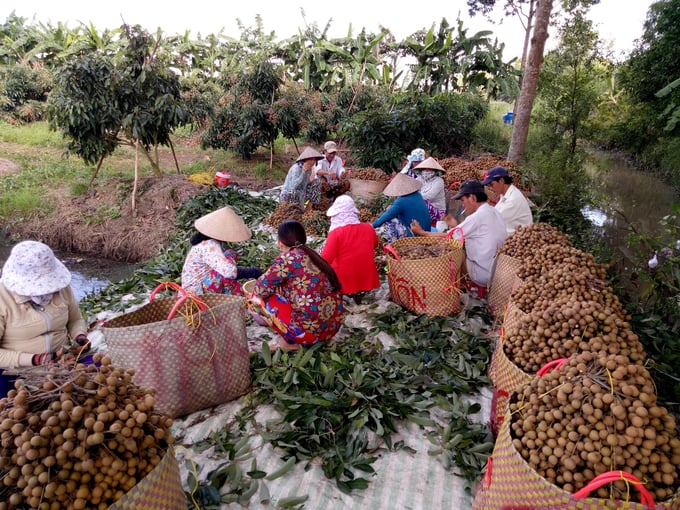
Ido longan of Dong Tam Cooperative, Dinh Mon commune, Thoi Lai district is now present in many difficult markets such as the USA, China, Korea, Japan, and Canada. Photo: Kim Anh.
We recently had the chance to visit Dong Tam Ido Longan Cooperative. Nguyen Van Hien, Director of Dong Tam Ido Longan Cooperative, was busy mixing fertilizer to move it to the garden in time in the morning to fertilize plants. “This is a particularly important time for longan trees, I need to take care of them using the right technical process for good yield”.
The time Dong Tam ido longan cooperative was established also coincided with the period when Dinh Mon commune reached NTM standards. Since then, the cooperative operated more smoothly, enjoying many advantages, especially the traffic system.
If it was in the past, transportation required a lot of steps. Farmers transported longan from the garden and gathered the goods at the communal wharf, then packed them on the truck. The main transportation route was the river, so it depended on the water. Longan needed to be consumed as soon as possible after harvest to avoid wilting, affecting quality, so on low water days, farmers were bound to suffer loss.
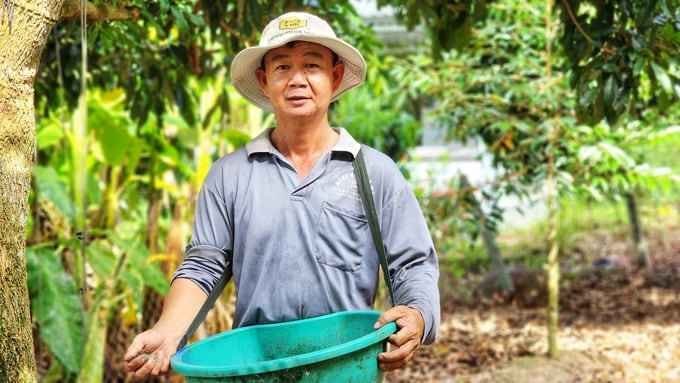
Nguyen Van Hien, Director of Dong Tam ido Longan Cooperative, a pioneer in bringing farmers to the collective economic model. Photo: Kim Anh.
But thanks to the NTM policy, the traffic roads were well-invested. Trucks got no trouble going to the garden to buy and transport the goods to the factory. Transport of fertilizers and pesticides was also faster. As a result, the cooperative's products are sold quickly and the agro-product value is enhanced.
The average output of ido longan Dong Tam Cooperative provided to the market at present is approximately 15 tons/ha/year, with the selling price ranging from VND 18,000 to 19,000/kg. Members of the cooperative earn hundreds of millions of Vietnamese dong every year.
Hien said the cooperative’s wish is that the traffic road will be upgraded in the future to meet the transportation demands of people in the area, and having a factory to store agro-products would create great opportunities for farmers to regulate the consumption stage.
Taking us for a walk around the alley in Dinh Khanh A hamlet, Le Son Tung, Chairman of Dinh Mon Commune Farmer's Union had his face brimmed with excitement.
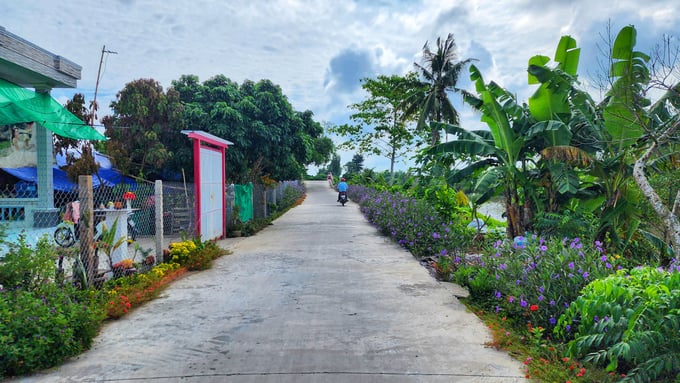
The model "Environmental landscape associated with production organization and rural economic development" has become typical in Dinh Mon the model NTM commune. Photo: Kim Anh.
“The economy was good, people had conditions to invest in building solid walled houses and other landscapes. Many of them also contributed to building facilities and upgrading the road from 2 m to 4 m wide, facilitating the transportation of agro-products and reducing dependence on the river route”.
According to Tung, in order to support farmers in the process of building NTM, the commune Farmer's Union pays special attention to investing in the development of cooperative groups and cooperatives. For example, nearly VND 19.5 billion from the Joint Program between the Vietnam Bank for Social Policies and the Central Committee of the Vietnam Farmer's Union has been disbursed to farmers borrowing capital for production development.
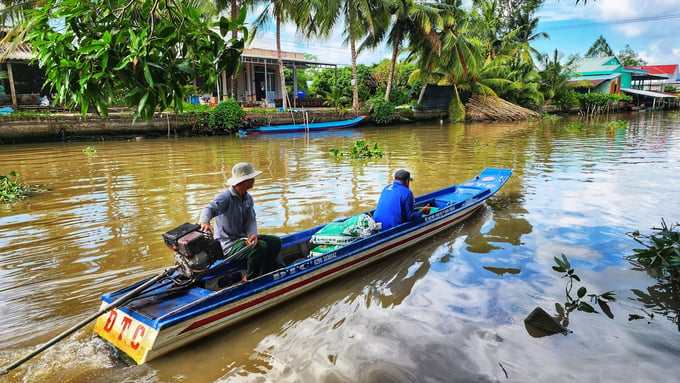
Rural transport is well invested, helping people in the commune reduce their dependence on the past river route. Photo: Kim Anh.
Dinh Mon Commune Farmer's Union also organizes short-term vocational training programs, signing and cooperation programs in selling agro-products with enterprises. Since then, farmers attains favorable conditions to produce according to market demands and make added-value products.
Translated by Samuel Pham

(VAN) Noting risks, report examines impacts of avian influenza, changing trade patterns since 2022, fish fraud, and shipping industry’s net-zero goals.

(VAN) Mr. Tran Quang Bao, General Director of the Forestry and Forest Protection Department, met and worked with the International Wood Products Association to promote cooperation in the field of timber trade.

(VAN) China's outbound shipments of rare earths in May jumped 23% on the month to their highest in a year, though Beijing's export curbs on some of the critical minerals halted some overseas sales.

(VAN) To sustain capital flow, administrative reform alone is not enough; what farmers truly need is an ecosystem where both government and businesses grow together in support.
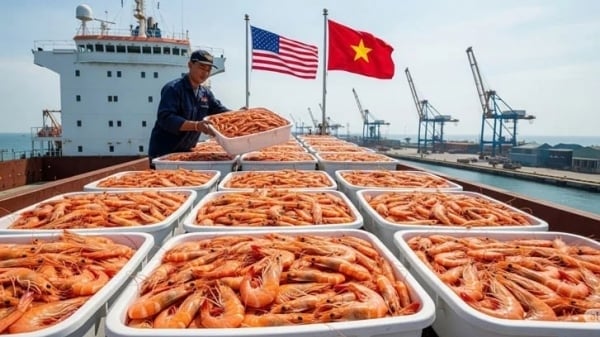
(VAN) Vietnam and the United States are proactively working together, each in their own way, to ensure that every container of agricultural goods carries not just products, but also long-term trust and value.
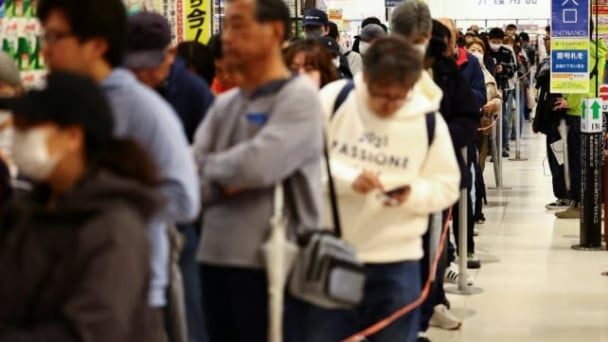
(VAN) Stores have started selling rice from the government’s stockpile to feed demand for the staple.
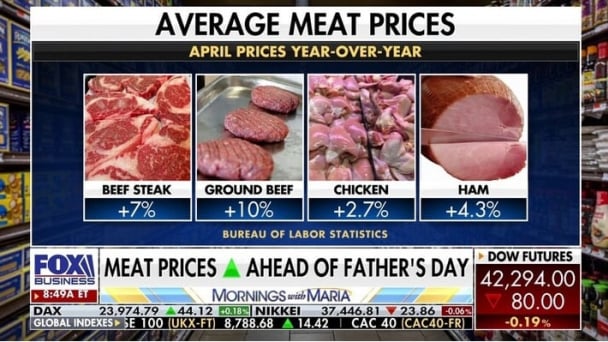
(VAN) Omaha Steaks CEO says rebuilding cattle herds will take about a year to ease price pressures.